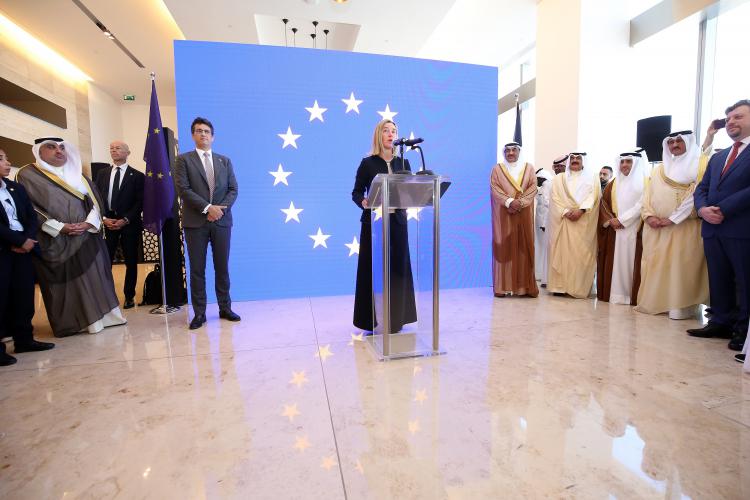- Negotiations

The European Union and the Gulf Cooperation Council signed an Economic Cooperation Agreement in 1988 which laid the framework for the elaboration of a bilateral free trade agreement between the two regional blocs. Formal negotiations began in 1990 and are still not concluded.
While the EU has powerful economic interests in liberalising investment rules in the Gulf States, so that EU corporations may participate directly in the region’s oil, banking, telecoms, port services and other industries, political issues have been publically blamed for blocking agreement. These include demands from the EU with regards to fulfilling standards of democracy and human rights, as well as clauses on cooperation against terrorism and weapons of mass destruction. Human rights groups, such as the International Federation for Human Rights, have urged the EU to insist on respect for freedom of press, women’s rights and labour rights of migrant workers in the Gulf countries in return for any trade concessions granted through the FTA.
At the end of 2008, the GCC formally announced it was suspending the trade talks due to the EU’s insistence on political demands.
last update: May 2012
photo: European External Action Service - EEAS/CC BY-NC 2.0
20-Jun-2010
The European Union (EU) and the Gulf Cooperation Council (GCC) last week celebrated 22 years of their relationship by launching a three-year Joint Action Programme (JAP) to move forward to stronger cooperation with confidence and optimism.
9-Jun-2010
Despite 98% of the issues of the long-awaited Free Trade Agreement between the GCC and EU having been successfully negotiated, the GCC’s decision to impose customs duties on EU exports remain the only sticking point, an EU source has said.
27-May-2010
Bloomberg
“Negotiations were suspended because EU countries added a clause depriving GCC countries the right to impose duties on EU exports in the future,” the Director General of the External Economic Relations Department at the Gulf Cooperation Council said.
22-Apr-2010
The UAE will push for a long-awaited free trade agreement between the GCC and the European Union during the Emirates presidency of the Gulf states’ bloc next year, said the Foreign Minister.
23-Mar-2010
Gulf Times
GCC states may once again refuse to resume free trade agreement talks with the European Union due to “intransigence” on the European side, a senior official said.
25-Nov-2009
Peninsula
Lobbies representing European petrochemicals and aluminum industries are attempting to stall the long overdue free trade agreement between the Gulf Cooperation Council and the European Union because they are concerned about compettion from the GCC
1-Oct-2009
Xinhua
The long-awaited negotiations on a Free Trade Agreement between the European Union and the Gulf Cooperation Council is expected to be completed by next March, a Kuwaiti senior official said Tuesday.
29-Sep-2009
Business 24/7
Gulf oil producers yesterday urged the European Union to stop setting conditions and sign a free trade agreement that has eluded the two sides for nearly two decades because of persistent rifts.
11-Aug-2009
SmartBrief
The EU is expected to drop "noneconomic demands" to which the Gulf states object, according to a report from the Emirates Industrial Bank.
27-May-2009
Gulf News
The six-nation Gulf Cooperation Council (GCC) is concentrating on trade talks with East Asia after negotiations with the European Union stalled, Sultan Bin Saeed Al Mansouri, Minister of Economy, said.






